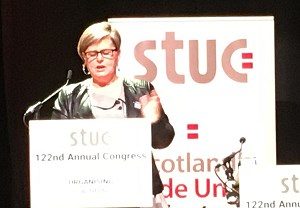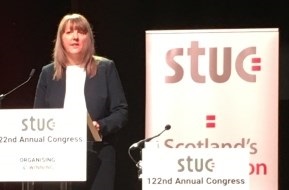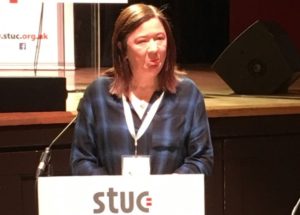
#stuc19 Commending around 8,500 Glasgow City workers, predominantly low paid women, who took part in the Glasgow Women’s Strike on 23 and 24 October last year demanding equal pay, and congratulating them on their well deserved win, Congress vowed to continue the fight against the blight of unequal pay across Scotland in all sectors and occupations.
Lilian Macer, UNISON Scotland, moved the composite on behalf of the STUC General Council, and highlighted the injustice that 50 years on from the Equal Pay Act, women in Scotland continue to suffer a gender pay gap of 15%.

Whilst welcoming the Scottish Government’s Pay Gap Action Plan, Lilian told Congress that it neglects the most important area where the gender pay gap actually takes place – in the workplace.
Lilian went on to explain that women remain heavily over-represented in occupations which tend to be lower paid and undervalued, are more likely to have caring responsibilities, to have part time work, or have zero hours contracts or to be subject to bullying or harassment. “While a number of factors influence the gender pay gap it must be recognised that the undervaluing of ‘women’s work’ is at its heart. Raising women’s pay reduces the gap.”
“Ultimately the gender pay gap will only reduce when we, the trade union movement, organise and make demands. As the Glasgow Women’s Strike shows, when women come together and take action, we win.”

Kim McLachlan, UNISON Scotland, explained the background to the Glasgow Women’s Strike, “These members, mainly low paid women, employed as carers, cleaners, clerical workers, caterers and school support workers had suffered the impact of ten years plus, of discrimination, legal wrangles and empty promises. They were members of the GMB and UNISON trade unions and many were clients of Action for Equality.”
Kim told Congress “We got organised! As membership grew, so did the confidence of our members and a whole new face of union activism was born. Key female leaders bubbled up from our membership and from social media campaigns. UNISON leaders stood aside as these women through a systematic organising campaign took the fight for equality to the council.”
“The key moment of unity came when all parties representing these workers realised we had more to gain by pulling our voices together than shouting out from different corners.”
Kim explained that the Court of Session in Edinburgh ruled in the workers’ favour in December 2017 and the Council agreed to settle out of court. “Sadly the Council official’s tasked with negotiating with the claimants side were not so keen to settle. Talks stalled and dragged on with little progress and finally our member’s patience ran out. The strike was on and what an impact it had.”
Kim congratulated the workers on how they told the media loud and clear what it was all about, “It wasn’t the union officials or lawyers facing the media that stole the hearts of those watching it was the strikers. The working women and men of Glasgow who had been denied their full pay. The unions merely reflected the glow from the striker’s stories.”
Kim said we owe the determined women workers a great deal, “ they have shaken up the unions locally and for the better and they are now at the heart of everything we do. We always say that a union is only as strong as its members and Glasgow’s women have been the absolute example of that strength.”
Later, Congress heard from two of the leaders of the Glasgow equal pay campaign, Lyn Marie O’Hara from UNISON and GMB’s Shona Thomson, as delegates paid further tribute to the Glasgow Women’s strike and watched a moving film recording the lead up to the major rally in Glasgow on 23rd October which was supported by people across the world.
Lyn Marie said there was one simple message, “Equal pay or we walk away.”
Lyn Marie told Congress about the themed demonstrations, wearing moustaches or dressed as suffragettes, about the members’ meetings and the phonebanks to reach out to all members and make them feel valued.
“We were the invisible workers became the visible workers who shut down the Council.”
Click here for more information on the STUC website.
